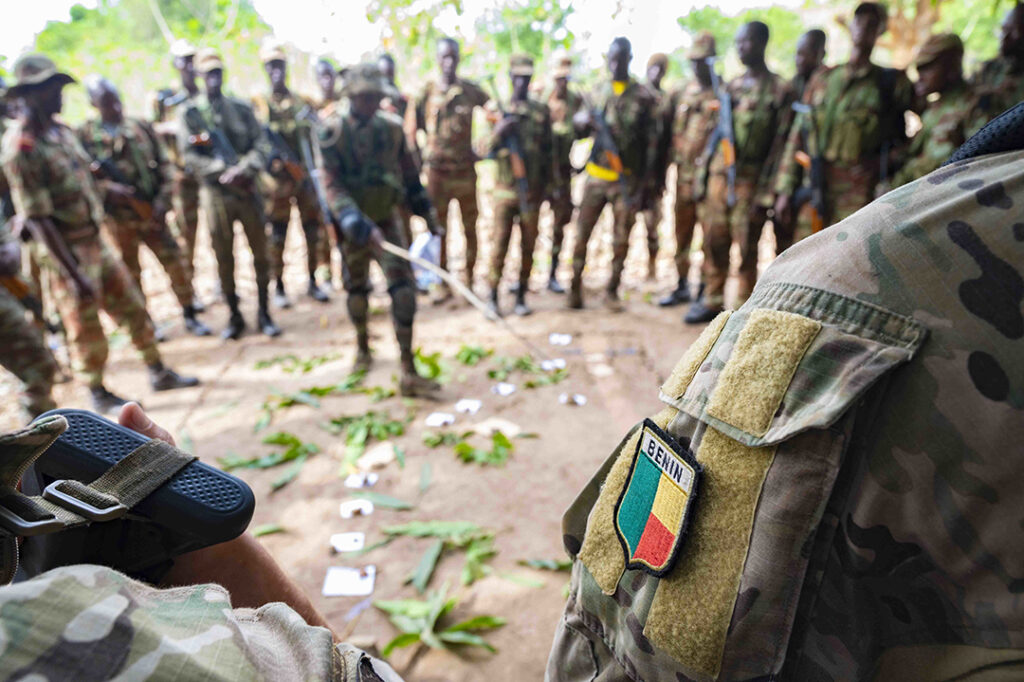ADF STAFF
About 100 armed men on motorcycles killed 18 civilians in Kaobagou, Benin, near the tri-border area with Togo and Burkina Faso in early May.
Survivors said that 15 victims had their throats slit, a homemade bomb was attached to one of the bodies and 12 villagers were missing. All the victims were young men.
It was the 10th incident involving violent extremist groups or sparked by inter-community tensions in Kaobagou since February 3, the Netherlands Institute for International Relations Clingendael reported. Kaobagou is an administrative division under the jurisdiction of the commune of Kérou.
“Did we really need this barbarity? In the name of what?” Kamel Ouassagari, opposition deputy from Kérou, said on his Facebook page. “There are no words capable of relieving such pain.”
Violence in the region has been relentless. One day after the Kaobagou massacre, three civilians were killed — with their throats cut — and one was abducted in the nearby village of Guimbagou.
Calling for Civilian Cooperation
In the wake of the Kaobagou attack, the Beninese government also called on civilians to report any suspicious activity to authorities.
As Jannine Ella Abatan, a senior researcher at the Institute for Security Studies, noted in a recent op-ed, Beninese authorities have for years relied on the Beninese Agency for Integrated Space Management to promote security and development in border areas.
The agency provides social services meant to build community trust in the defense and security forces and works to dissuade locals from joining violent extremist groups.
Benin also has implemented community policing, and its armed forces connect with civilians by offering health care to communities. This enables them to become familiar with locals and encourage them to collaborate and tell security forces about threats.
The government of neighboring Togo also has called on civilians for help as violent extremist groups look to expand their territory from the Sahel region toward the Gulf of Guinea. As Abatan noted, Togo established the Inter-ministerial Committee for the Prevention and Fight against Violent Extremism in 2019.
Like Benin, Togo has experienced increasing violence against civilians. Attacks in the villages of Tola and Gningou in Togo’s Savanes region killed 31 civilians in early February.
The committee is tasked with “[eradicating] or significantly [reducing] the spread of violent extremism throughout the Togolese territory” and enhancing “cooperation and collaboration between the administration, defense and security forces, and civil society,” the Togolese government said in a statement.
The Togolese military’s Operation Koundjoaré seeks to reinforce security along the border with Burkina Faso. The operation involves providing free medical consultations to locals to encourage them to contribute to intelligence efforts.
Guaranteeing Civilian Safety
However, as attacks increase, Benin and Togo need to guarantee the safety of civilians if they want their continued support, Abatan argued. Extremists have threatened reprisals against civilians cooperating with state forces and their partners.
Abatan argued that security forces must be “uncompromising” about protecting their sources, and that interactions between security forces and civilians should include conversations that help the state respond more efficiently to a community’s needs.
“As the threat evolves, the impact of the various responses on civilians must be continually assessed so that necessary adjustments can be made,” Abatan wrote. “This will enable Benin and Togo’s authorities to be responsive to people’s needs and guarantee their safety — an essential recipe for long-term collaboration between the state and its people.”

